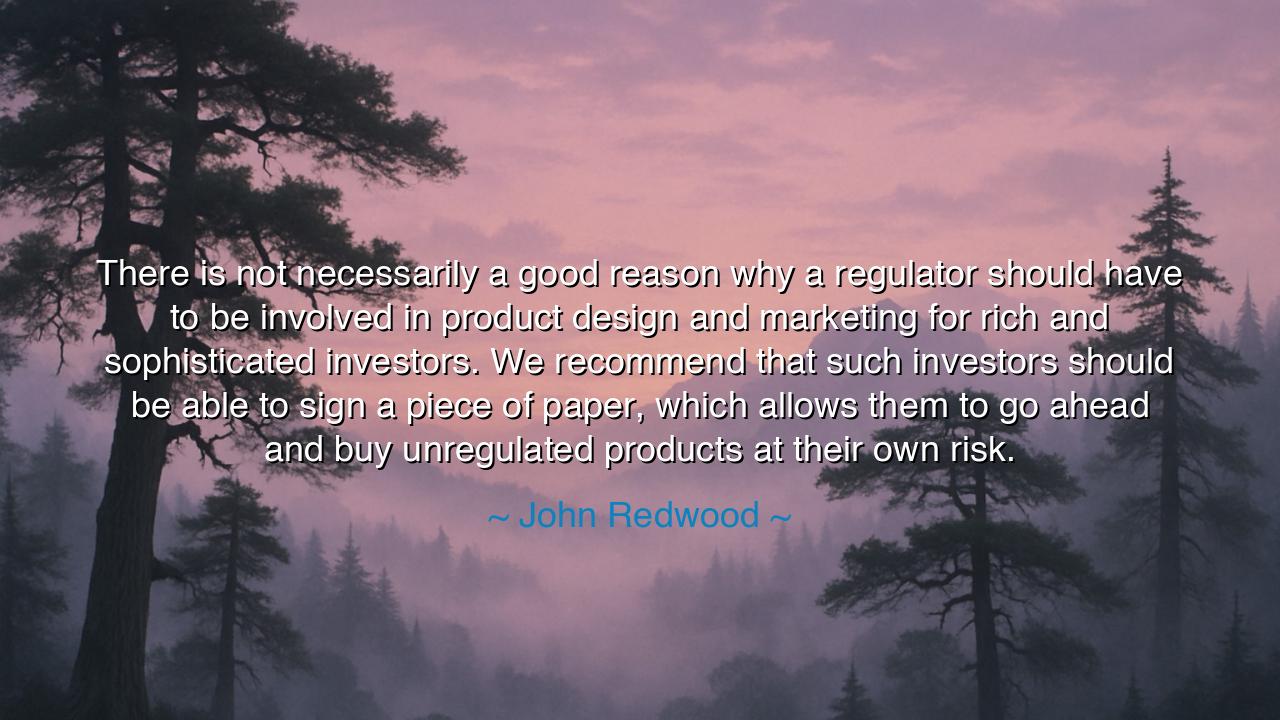
There is not necessarily a good reason why a regulator should
There is not necessarily a good reason why a regulator should have to be involved in product design and marketing for rich and sophisticated investors. We recommend that such investors should be able to sign a piece of paper, which allows them to go ahead and buy unregulated products at their own risk.






The words of John Redwood—“There is not necessarily a good reason why a regulator should have to be involved in product design and marketing for rich and sophisticated investors. We recommend that such investors should be able to sign a piece of paper, which allows them to go ahead and buy unregulated products at their own risk”—speak not only to the realm of economics, but to the deeper law of human responsibility. Within these words lies the eternal balance between freedom and accountability, between the liberty to act and the burden to bear the fruits of one’s own choices. Redwood, in speaking of wealth and regulation, reaches toward an ancient truth: that wisdom, not law, must be the guardian of those who possess power.
In every age, the powerful have sought freedom from constraint, believing their strength or knowledge sufficient to guide their actions. Yet the ancients knew that liberty without discipline is perilous. The philosopher Plato warned that a city of the free may destroy itself if its citizens mistake license for virtue. So too does Redwood, in his modern tongue, imply a separation of worlds—the many who must be protected by rule, and the few who, by their experience, may be entrusted to govern themselves. His vision is of an order in which regulation yields to personal responsibility, where the wise and the wealthy act not as children bound by law, but as stewards accountable to reason and consequence.
To understand his words fully, one must recall the context of commerce and governance. A regulator exists to protect the common person—the one who lacks the knowledge or the means to discern the dangers hidden within fine print and promise. But for the sophisticated investor, Redwood argues, such guardianship is unnecessary. Just as the sea captain needs no one to teach him the stars, so the financier, tested by markets, needs no hand to guide his risk. Let him sign his name, says Redwood, and accept the destiny of his choice—whether it leads to wealth or ruin.
This echoes the wisdom of the merchant cities of ancient Phoenicia, where traders crossed oceans on ships built by their own design and sailed under their own peril. No king or priest regulated their ventures; their reward and loss were their own. Their courage built empires, but their arrogance, too, brought disaster when storms or greed overtook them. So it is in every age: freedom bears both creation and collapse within its grasp. To remove regulation from those deemed capable is to trust that wisdom will triumph over folly—but history teaches that even the wise may err, and the rich may be blinded by their own brilliance.
Yet Redwood’s insight does not glorify recklessness; rather, it acknowledges a deeper truth of civilization. To live well, one must accept the burden of risk. No law can shield the soul from its own decisions. A society that overprotects its people weakens them, for courage and prudence are born from the dance between danger and choice. When a man signs his name to a risk, he binds not only his wealth but his honor. In that act, he steps into the ancient covenant of human freedom: to stand by one’s actions and to bear their consequences without complaint.
Still, the wise must remember: freedom is not the absence of limits, but the mastery of them. Just as the archer’s bow must be drawn to the right tension—not too loose, lest the arrow fall, nor too tight, lest it break—so must the freedom of enterprise be balanced by conscience. To seek a world without regulators is noble only if those freed by it govern themselves with integrity. Without that inner regulation, freedom becomes folly, and the marketplace a battlefield where greed devours wisdom.
Let this be the teaching, then, to the generations who would inherit such freedom: Know thyself before claiming liberty. If you would walk without guidance, ensure your steps are steady. If you would act without oversight, let honor be your law. Do not demand the right to choose unless you are ready to bear the weight of your choice. For every signature on the paper of risk, whether in trade, love, or life itself, is a covenant with destiny.
Thus remember the spirit of John Redwood’s words—not as a defense of the powerful, but as a reminder of the eternal bond between freedom and responsibility. To live unregulated is to live awake, aware that every gain may turn to loss, every liberty to lesson. The wise do not fear this truth—they embrace it. For to govern oneself is the highest art, and to bear the cost of that governance with dignity is the mark of true greatness.






AAdministratorAdministrator
Welcome, honored guests. Please leave a comment, we will respond soon